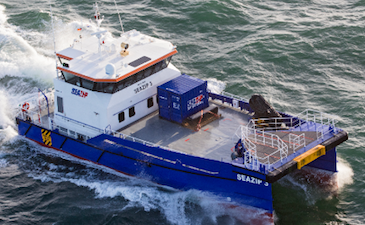The following is a news release from Netherlands Maritime Technology (NMT):
(ROTTERDAM, Netherlands) — A unique series of autonomous operations trials were held on the North Sea on March 19 and 20, about five nautical miles off the coast of Den Helder. SeaZip 3, a Damen Fast Crew Supplier 2610 "Twin Axe" (Bureau Veritas class, Netherlands flag) from SeaZip Offshore Services, was outfitted with collision avoidance technology and took part in several nautical scenarios to determine how the vessel would interact with seagoing traffic.
The trials are part of the Joint Industry Project Autonomous Shipping, a two-year research and innovation project started in 2017 and focused on autonomous operations of seagoing vessels.
“We are proud that our consortium of 17 partners established the first-ever autonomous operations with seagoing vessels held at the North Sea," said Marnix Krikke, innovation director at Netherlands Maritime Technology and project leader of the Joint Industry Project. “A total of 11 scenarios were run in which SeaZip 3 interacted with two other vessels: Octans, a training vessel of the Maritime Institute Willem Barentsz, and Guardian, an emergency towage vessel operated by the Netherlands Coastguard. These scenarios are the outcome of research by Technical University of Delft, MARIN and TNO. The scenarios were first tested in the MARIN simulator center in Wageningen and now, last week, in a real-life environment on the North Sea.”
By testing the scenarios on the North Sea, the partners involved were able to show the decision-making process of an autonomous system in ensuring safe sailing and avoiding collisions with other vessels. The autonomous system provided by Robosys Automation, connected to the onboard autopilot and machinery control system, performed the evasive maneuvers in a safe way. It was concluded that further development of autonomous systems is needed to cope with complex marine traffic situations in a more efficient way.
Autonomous shipping road map
The demonstration provides input for an autonomous shipping road map which will define the lessons learned and the obstacles, technology and potential as well as the steps to be taken toward further realization. The roadmap will guide development of technology within the Netherlands maritime industry, the knowledge institutions, the academia and the government. These include not only technical issues but also those in the regulatory field and aspects such as risk management.
Mark van der Star, managing partner at SeaZip Offshore Service, said that the impact of autonomous shipping and the possibilities it offers are enormous. “We are continually busy with innovation at SeaZip Offshore Service and proud that our offshore service vessel SeaZip 3 is the first ship to carry out a fully autonomous test on the North Sea," he said. "Participating in this project has enhanced our knowledge in a wide range of fields and will help us grow further as a shipping company in the future.”
Broad consortium
This Joint Industry Project is unique in the sense that it is supported by a broad consortium of stakeholders: shipping companies SeaZip Offshore Service, Fugro, the Dutch Pilotage organization, Damen Shipyards and Feadship, naval architects DEKC Maritime, technology suppliers Bosch Rexroth, Robosys Automation, knowledge institutions MARIN, TNO, Technical University of Delft, classification society Bureau Veritas, maritime academies Maritime Institute Willem Barentsz – NHL Stenden University of Applied Sciences, Rotterdam Mainport Institute (STC and Rotterdam University of Applied Sciences) and project coordinator Netherlands Maritime Technology. The Dutch government is represented by the Ministry of Infrastructure and Water Management and the Ministry of Defense (Defenxe Materiel Organisation). It is partly funded by the TKI-Maritiem allowance of the Dutch Ministry of Economic Affairs and Climate Policy.

